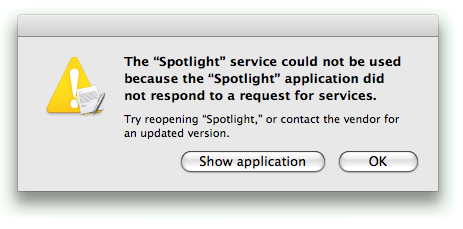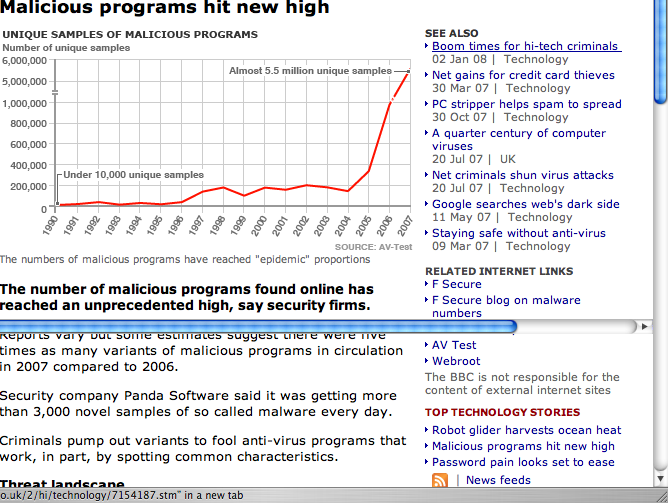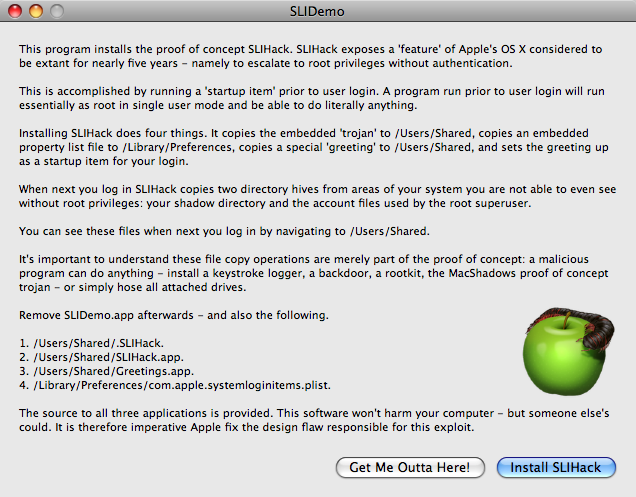Home » Learning Curve » Red Hat Diaries
Back BurnerA pretty cool place to be.
So Mac OS X is on a back burner, says Steve Jobs, says John Gruber. (About the same thing.) There is no hidden meaning in this, says Steve Jobs. This is just the normal cycle of things.
Computer corporations - and Apple were a computer corporation once upon a time - go through phases like this all the time. IBM phased out their PC division completely. They phased out their Selectric the same way. Corporations in the other industries do it too. Shareholders aren't alarmed - it's just the normal cycle of things.
Former NeXT programmer Scott Forstall handpicked his iPhone team sometime back in 2005. From the best he could find at Apple. What he didn't want were the ones he called 'deterministic'.
Forstall took his team from the Mac OS X team. All that was left were the ones he didn't want. This was the core team that continued developing Mac OS X.
The iPhone project took at least two years. This means it was in full swing by early 2005 - most likely before Mac OS X 10.4 Tiger was released on 29 April. And who can forget the screen remnants, the buggy new kernel programming interfaces, the chopped up scroll bars, the cropped mail messages? Good stuff.
Scott Forstall's secret iPhone project continued - with the best of the best - and the 'rest' continued on with Mac OS X 10.5 Leopard - a release universally derided, a release that directly caused the $29 release of 10.6 Snow Leopard, more a bug fix than anything else.
And still the bugs aren't gone. The awaited 10.6.4 is already up in the 600 MB class. And of course has 'no known issues'. Just like the previous 10.6.3. 600 MB for an update to something that had 'no known issues' is a lot of megabytes.
NeXT/Apple chief hardware engineer Jon Rubinstein and NeXT/Apple chief software engineer Avie Tevanian quit Apple on the same day in early 2006: 31 March, the day before the corporation's 30 year anniversary. There was no hidden meaning there either. It was just the normal cycle of things. Jonathan Ive, Scott Forstall, and Bertrand Serlet took over after them. No hidden meaning. Just the normal cycle of things.
Mail started crashing on drops to its dock icon. Mail started munging encodings, even producing encodings that didn't exist. Mail started dropping lost files on disk. No hidden meaning.
Safari started letting surfers edit read-only pages. No hidden meaning. Now Safari issues cascades of obnoxious popups when plugins aren't found. The normal cycle of things.
Apple started using a 'hack' to give people critical system updates without submission of the admin password. No hidden meaning.
Tooltips extend beyond the width of the screen and can't be turned off. Mail lets users move messages into a hidden drafts folder - and then won't let them get at those messages. [But compensates by showing messages that don't exist.]

Leopard introduced honking loudspeakers. Plain text Mail message drafts that automatically come up as rich text instead. Tabbing in a sheet in one application yanks you out and drops you into another application. Pasteboard services screwed up. Cocoa services go straight downhill. (This continues in Snow Leopard where Apple tier one support don't even know how to fix the mess.)
Safari's cookie sheet becomes unwieldy. Inodes are destroyed, files aren't opened for writing, suddenly Unix gets the new concept of the 'locked' file.
Active Directory functionality is totally hosed and admins complain of losing their bonuses because the programmers Forstall left behind released a product that didn't work. Sheets have an additional window object at the top for the shadow. Brainaic hack of the century. Window shadow becomes obnoxiously excessive. /home and /net completely stall file operations on their recurring timeouts. The shift-cmd click operation gets redefined for no good reason.
Spaces with multiple monitors didn't work right. There were problems with the firewall. But they promised to 'fix it later'. Gee thanks.
Time Machine breaks time-tested Unix design rules. Apple's adoption of DTrace has Adam Leventhal and the other Sun developers screaming at the sky. Cornflower blue arrows in the dock that nobody can see.
Tonnes of legacy bugs from Tiger and earlier never fixed - in fact they just dumped all the open tickets back in the laps of the programmers, telling them in so many words they'd never be fixed. Mail still can't handle Cocoa services at this point - and it was once based on NeXT's NSText and worked without a hitch. How do you take good code somebody gave you and ruin it? Ask the people Scott Forstall left behind.
AppKit leaking memory all over the place. Mail trying to send out messages with no recipients. launchd and launchctl start taking over. Apple offer the code to the rest of the open source community but nobody wants it. The command 'launchctl singleuser' hoses login sessions.
Rixstep visitors start echoing their frustrations with Apple and the OS.
'I have been describing Leopard to people as the 'lowrider bicycle' of the computer world.'
'Pretty disappointed with the Leopard? Me too. For many reasons but mostly for this stupid tendency to replace good stuff with broken half-assed surrogates. Moving stuff to trash freezes the Finder for a good 3~4 seconds, the progress bar of 'Empty Trash' counts down to a certain number of remaining items and then it gets stuck there while the trash is already empty. Only a relaunch will get rid of this frozen progress bar. And so on and on. It's all over the place and it's terribly disappointing - and it's also very frustrating knowing that most of the broken stuff won't be fixed anytime soon.'
'Right-O. Yes I think they do want you to pour a nice warm mug of Shut-the-F-Up for the winter and come out of hibernation in Jan/Feb when 10.5.2 is out - which ** NDA ** will address numerous bugs and issues ** End NDA **. But no not all of them - just pump 'em into the black hole, have 'em merge with existing bugreporter numbers that are unable to be read - you are unable to contact that author and collaborate with them, all critical mass is lost, much like the Apple Developer Connection which lacks any private forums where we can discuss these sensitive things that Apple calls NDA. Instead we resort to posting in semi-private forums with 10.5 beta screenshots along with admonitions to not spread the pics for fear of Apple Legal™ - if we are supposed to test and fix Apple's stuff but can't even discuss the bugreporter (any responses to it are NDA) I don't see how this can work - lots of people holding their breath turning blue in the face, only to explode in red faced anger.'
More and more the enterprise market (remember the VT cluster) is a distant memory.
'So in essence they're stating that as long as their machines don't become accepted in the IT departments they're totally safe. Great. I guess some people won't be exchanging HP-UX-64 servers that provide file mounts and shells for 50,000 students over to Apple. What a shame.'
'I've given Leopard a chance but it's pretty clear this is not a good operating system release', wrote Dave Winer on 5 November.
But there's no hidden meaning. This is just the normal cycle of things.
And how about the transition to Intel? Anyone remember when that happened? Wasn't that during the iPhone development cycle as well? Anyone remember Apple Defects? Anyone remember the mooing, the oozing, the shutdowns, the dead on arrival hardware? You can still take a walk down memory lane.
'Leopard is nothing for Apple to purr about', wrote Charles Arthur of the Guardian. He complained his system froze after network disconnects and waking and that it was sometimes slower than its predecessor.
'Leopard's a big black mark on Apple's record - I doubt even Britney will want it', he concluded.
The normal cycle of things.
Serious issues with wireless connectivity. Interfaces dumbed down beyond the pale. 'TF Finder' loses all semblance of respect as Unix file permissions are reduced to 'read-only' and 'read and write' and users can no longer set executable bits.
The obsequious table view is tormented and slaughtered, running myriad CPU-sucking threads, screwing up the selection logic for the first time not only in Apple and NeXT history but in all PC history. (And it's still unfixed today but the brave few Forstall left behind are still struggling with it, really they are. They don't seem to have access to the perfect Tiger code which miraculously still worked - either that or they've still not thought of going back to check.)
Finder issuing context menus when nothing's selected, resulting in crashes.
Safari suddenly gets two vertical scroll bars at once. So bad it's almost good. New temporary file locations right out of a system designer's worst nightmare.
Cocoa services (such as Spotlight's own) start tripping over their own feet and telling users to contact the vendors for further information. But Apple are the vendors - anyone getting anywhere contacting them?

The massive data loss scandal: it's found that low level Apple file ops to 'move' files across volume boundaries start by deleting the source before the destination is in place and checked for consistency. People are losing gigabytes of important data. No one in the industry has ever screwed up as bad. (But of course Dilger is out early explaining why things like this are bound to happen.)
It's suddenly illegal to put empty strings on a pasteboard but it's also suddenly legal to put potentially lethal nil objects there instead.
Preview strewing the disk with empty folders, one for each image ever opened. Safari 'inspect element' crashes the browser if JavaScript isn't first enabled. Preview crops one pixel too many on the right. The Cocoa document controller circumvents POSIX file permissions for perhaps the dumbest reason ever - Unix creators are screaming bloody murder. Safari still munges menu bars. Network Utility is still the equivalent of an AppleScript app, wrapping Unix command line utilities in the slowest network interface ever known to man.
Low level file system APIs can't handle 64-bit inodes and the new 'open source' code that's to deal with them is kept proprietary. The messaging API, kept in the publicly accessible 'Frameworks' folder along with its header files, is suddenly deprecated with the explanation that it was never intended for public consumption despite there being a 'PrivateFrameworks' folder specifically for this purpose, and with the official workaround being to use AppleScript to interface with Mail?
The normal cycle of things. No hidden meaning.
NSTextView is suddenly sluggish beyond the bearable. Xcode crashing if it can't create a directory it never uses, and leaving behind other junk in temporary areas. QuickTime 7.4 breaks apps left and right.
Safari vertical scroll bars disappear entirely. Safari horizontal scroll bars get embedded in the middle of web pages.

Hundreds of megabytes of designable.nib files shipping with OS updates. 'Timers' introduced into the table view suddenly corrupt double-click actions. (Still not corrected.) 'Mnemonics' introduced into the table view still don't work right and produce absolutely random erratic (incorrect) results.
Safari cookie settings still don't work as advertised. The new metadata layer built underneath the launch services crashes the launch services and client applications. Interface Builder loses changes to NIBs.
10.5.3 is another monster (>400 MB) download with 25,696 items to be updated. This after three previous releases of what was supposed to be a completed system before 10.5.0. 10.5.3 ships with 160 MB of 'designable.nib' files. 160 MB.
[10.5.2 shipped with 120 MB of them. Things are getting only worse. The normal cycle of things.]
905 items, 160504925 bytes, 317224 blocks, 0 bytes in extended attributes.
Safari found to have a one year response timeout on web accesses; this incredible 'bug' together with a keychain bug causes Safari to effectively 'DoS' websites.

Safari still works with only one keychain entry per domain, despite any website being able to have different authentication systems at different locations. Safari JavaScriptCore crashing all over the place.
Spotlight starts mucking with the file system itself.
Opener and Oompa Loompa hit. (Inq-Tana didn't hit - it was just a white hat POC.) Opener was a root exploit open for several years. Then another root exploit was found. Further hacks were found that could exploit legacy NeXT conventions to hijack user sessions and 'get root'.

The ARDAgent root exploit is discovered. No hidden meaning.
Mail found to cache sensitive private information in lots of new places. (And it still does to this day.) 'TF' Finder sees dead people. No hidden meaning.
Safari 4 found leaving dangerous data trails that threaten user privacy and building up 100s of MBs of caches for 'top sites'. Mac OS X Hints issue '14 tips' to counteract. The story even reaches Slashdot 'Your Rights Online'. The normal cycle of things.
I really like Safari but I'm going to have to seriously consider using Firefox now.
- C Harwick
'Empty cache' doesn't delete everything. Before: 737 MB. After: 571 MB. Files are scattered all over the place. This is seriously fucked up.
- 'mallumax'
The launch services found to have a fatal flaw left unfixed for over one year. This flaw is so grandiose that files don't even have to be opened for things to start crashing.
/Library is still a confusing mess of user preferences, system preferences, and wacky uneducated schemes intended to keep ordinary users away from system files put in the wrong location.
Rumours start flying (perhaps understandably) that Apple actually want to toss their OS X Server under the bus. 'We've had problems for months now, big problems with our OS X 10.5x Server in connection with server based user folders', wrote Philipp Reinheimer who set up an entire domain just to draw attention to Apple's betrayal.
'Administrators around the world are frustrated and clueless. Apple says nothing. There is no feedback, help from Apple Enterprise support is like a trying to poke through fog. Many now believe that there is such a serious problem with the AFP protocol that even Apple developers are helpless.'
'We administrators no longer know where to turn. Apple is not being helpful and provides no feedback or support of any kind.'
It's harder and harder to be an Apple apologist after the nonstop bugfest that is Leopard. Apple refuse to admit there is a problem and as Leopard goes on the bugs become more numerous.
- 'foidulus'
You're going to be waiting in vain for a fix from Apple. Your best bet is to switch over to SMB/CIFS which can and does handle those kinds of loads. Apple never test anything that they do on large enterprise deployments because they actively avoid enterprise solutions and their company culture does not put a priority on addressing enterprise needs beyond putting up a nice PR web page about VT when they buy 200+ Xserves for a computing grid.
- 'SC68Cal'
And so it went. Apple receive over one million bug reports per year. Most are never acted on. Apple Computer inherited NeXTSTEP/OPENSTEP in 1997 and then spent five years taking it apart so they could put it together again - with no known improvements. They began selling iPods almost immediately after that, and by the time the company were readying the release of version 10.4, the iPhone project was already underway, and the few stellar minds they had were taken from the OS X system code, leaving the likes of 'Buzz' and 'Punkass' - people who to this day, after having worked at Apple for years, still don't know how to correctly package release software. The 'deterministic' leftovers Scott didn't want.
Snow Leopard was sold for only $29. As a 'maintenance update'. The last reasonable OS X update Apple had was over five years ago. Back when the iPhone project was still in its infancy.
Back burners are supposed to keep things warm. But on Apple's back burner they're frozen cold.
|